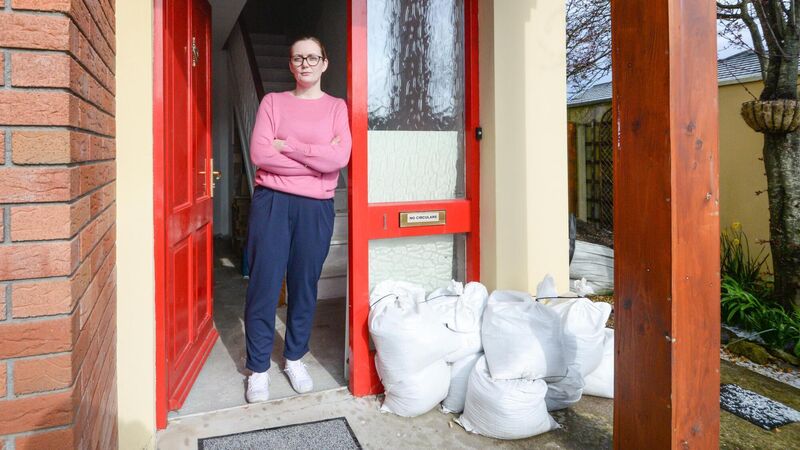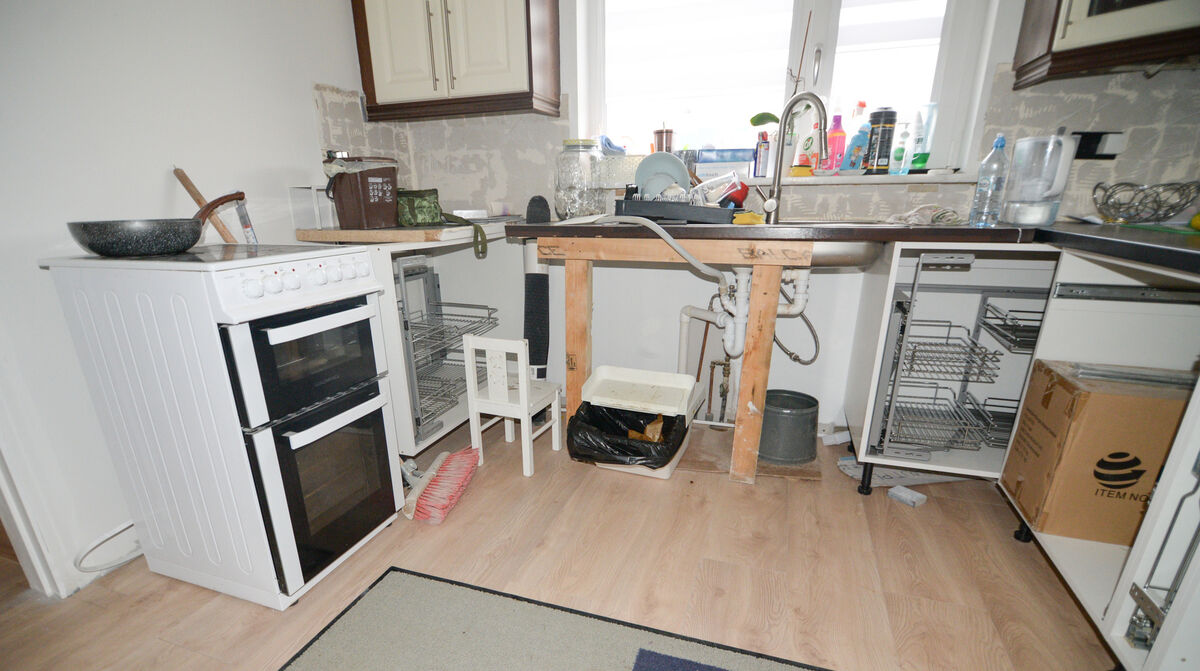Residents in fear as Storm Babet a 'calling card' for future flooding

Sandbags outside Caroline Leahy's Midleton home, flooded in Storm Babet. Picture: Cian O'Regan
Raindrops give Caroline Leahy the shivers the minute she hears them.
Her chest tightens and she starts to panic. This is because the 38-year-old Cork city legal executive is one of hundreds of householders whose homes in and around Midleton were flooded last October.
Like so many homes in the town, hers is also still in the throes of being rebuilt.
She says many of the 60 or so houses on her estate are still wrecked from the floods, and a big reason is the complicated process of drawing down humanitarian aid from a €10m fund announced last year in the wake of Storm Babet.
Skips can still be seen outside people’s houses, along with piles of sandbags. Some businesses in the town are only just reopening.

As well as grappling with the €100,000 bill for damage to the house, the floods have left Ms Leahy with a deep-rooted fear that the house she owns with partner Aidan Murphy will be flooded again.
“I can’t let go of the sandbags,” she says of the eight or so white sandbags in a heap at the side of her front porch.
“Each and every time it rains, I become very anxious, I get a tightness in my chest and I automatically start panicking.
There are many more like her.
A few miles away in Mogeely, Gleann Fia estate resident Christian Kyriacou says he too gets up to check that the three-bed semi he lives in with his wife Milena and their children Ryan, 12, and Mia, 4, is not being flooded.
Virtually all of the ground floor was destroyed in the flood and the family now lives upstairs as work is still being carried out.
The delay has much to do with the family being told by the Department of Social Protection administering funds for flooded residents that the €70,000 they need to pay for a basic restoration will have to be paid upfront before they can get it back.
“It’s money we, along with other homeowners, just don’t have,” Mr Kyriacou said.

If a new report is anything to go by, many hurt by the Storm Babet damage will be facing the threat of floods for years to come.
A study commissioned by RTÉ’s team has concluded that the extreme rainfall and resultant flooding which devastated Midleton and surrounding areas during Storm Babet last October was more than twice as likely to happen due to global warming.
The study, carried out by leading international climate scientists, found the chances of such heavy rainfall occurring are now 120% more likely.
The “climate attribution” analysis, the first of its kind in Ireland, examined the impact of climate change on this extreme weather event.
The research was led by Dr Ben Clarke from Imperial College London, and involved researchers from the Icarus Climate Research Centre at Maynooth University and Met Éireann.
“The town and the area had a lucky escape because the river flooding hit at the spring low tide," said Icarus Professor Peter Thorne, one of the study’s authors.
“The ocean acted as the very, very best friend Midleton has ever had as it let the waters out and acted like a vacuum cleaner, drawing that water out of Midleton as the flood hit.
Midleton would have been flooded higher and it would have been flooded for longer.
“This could have had potentially fatal consequences, particularly if it had hit hours earlier in the morning when lots of people would have been asleep.”
What happened last October is, he said, going to happen more frequently and the floods are going to be more severe.
“The Storm Babet floods were a calling card,” he warned. “This is just the first performance. It has not yet reached a crescendo.”

If the people of Midleton are hoping for flood relief, they will be waiting a long time, as Cork County Council has now said that it anticipates the scheme will only be submitted for statutory consent in 2025.
As far as early warning of floods is concerned, a spokesperson said: “Investigations to date suggest a flood warning system for Midleton would not be effective.”
So, for now, other petrified Midleton residents and the town’s businesses are going to have to rely on various WhatsApp groups that have sprung up to warn each other of flooding risks.

Added to that, many, especially residents and members of the Midleton East Cork Flood Action Group, feel they are still being left to fend for themselves.
Chairperson Mona Stromsoe said: “While the scheme set up to help businesses in the town has helped a lot of people, the scheme to help residents is far more complicated.
“We are hearing of people being assessed in the size of their house, we have heard of people being means-tested, and we are hearing of people being told to do all the work and reclaiming back later from available State funds.
“But given that a lot of the work is around €80,000, nobody has that kind of money to draw down in the hope the State will pay it all back.”
The Department of Social Protection was asked for a comment.
Check out the Irish Examiner's WEATHER CENTRE for regularly updated short and long range forecasts wherever you are.





